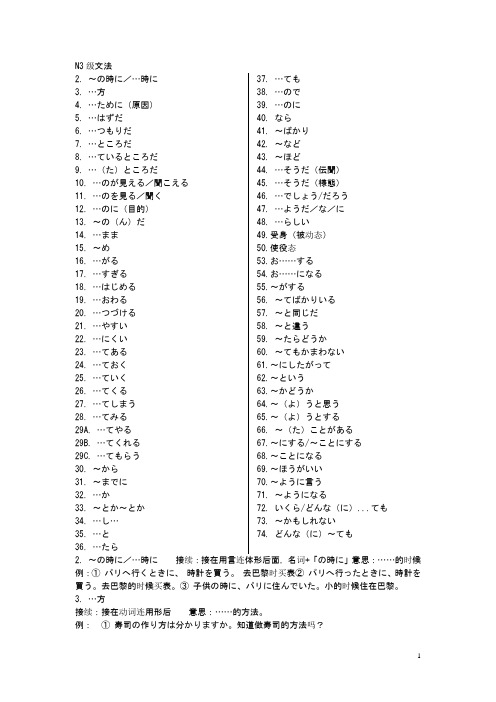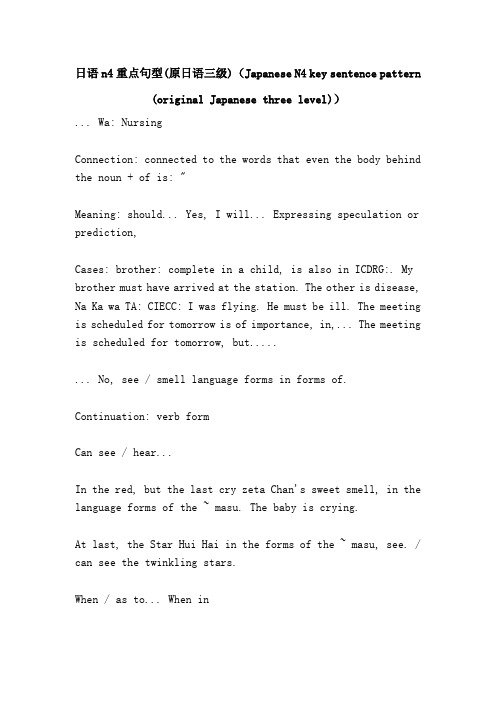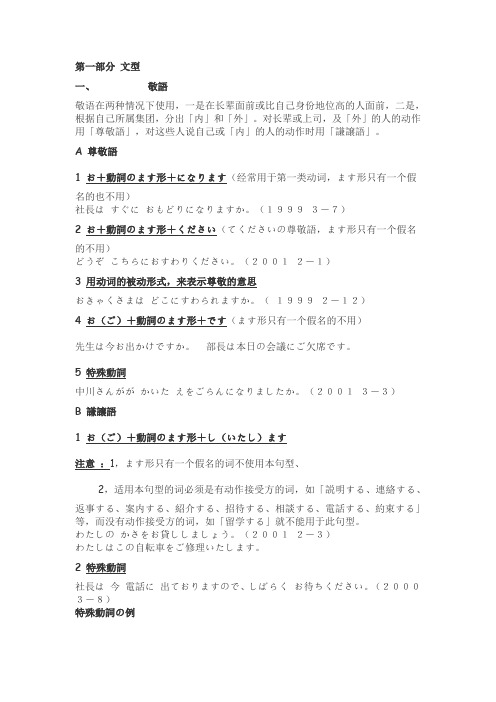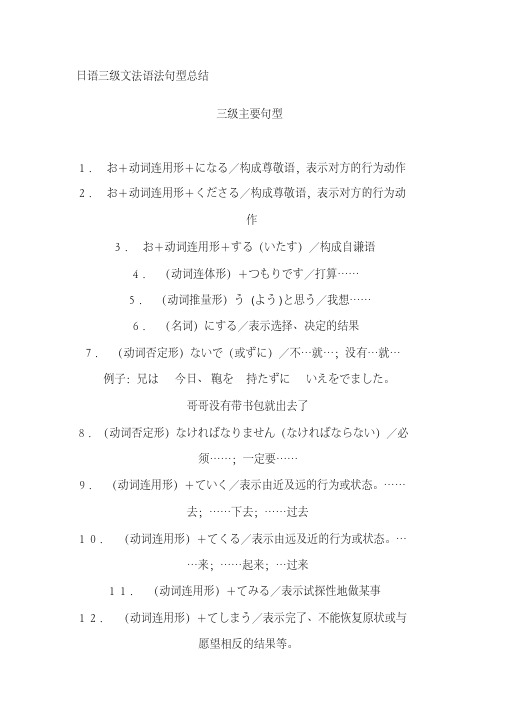日语三级句型解说
日语三级四级语法

最近在看《国际日语水平考试300句型--3级,4级》,我个人觉得很不错的!贴出来和大家一起学习,希望能得到大家的支持!现在的论坛里有1级和2级,刚好没有3级,我就来补个空档吧!本书按照语法功能将300个句型编排为26课,各课分别按照4级和3级顺序排列内容。
本人打算一次学习3~4个句型。
每周两次,星期五和星期二更新。
如果大家有好的建议和意见请提出来,我会改进的。
一,时间空间关系1、~前に名词の+前に动词基本形+前に夜寝る前に乳牛を一杯飲むことにしている。
/晚上睡觉之前都要喝一杯牛奶。
A B表示B项行为发生在A项行为之前。
可译为“……之前”。
①パーティーに来る前にちょっとした余興を用意した。
/来参加晚会之前准备了小节目。
②これからの進路を決める前に一度先生のご意見を伺ってみたいと思う。
/在决定今后的方向之前我想先听听老师的意见。
③大学に入る前に一年浪人をしたことがある。
/上大学前曾补习过一年。
※~前还可以用于表示空间,“……前面”。
如:図書館の前に大きな池が掘ってある。
/图书馆前面挖了一个大池子。
2,~後/~後で/~後に名词の+後/後で/後に动词连用形+た+後/後で/後にこの薬はご飯を食べる前に飲みますか、ご飯を食べた後で飲みますか。
A B这药是在饭前吃,还是在饭后吃?表示A项事件结束之后发生了B项事件。
可译为“……后”“……之后”。
①会談を済ませた後に、1時間ほど休憩した。
/会谈结束后,休息了一个小时左右。
②卒業生を送った後では、教師としてはいつも寂しい気持ちにおそわれる。
/送走毕业生后,作为老师总是觉得有些寂寞。
③夕立がやんだあとに、虹がかかった。
/阵雨停后,挂起了彩虹。
④この小説、あなたが読んだ後で私にも貸してくださいませんか。
/这本小说你看完后],也借给我看看好吗?※後で的后续项(B项)不能是持续性的动作或状态。
如:×夕食の後で、散歩していた。
/晚饭后散了步。
○夕食の後で、散歩した。
日语N3级语法

N3级文法2. ~の時に/…時に3. …方4. …ために(原因)5. …はずだ6. …つもりだ7. …ところだ8. …ているところだ9. …(た)ところだ10. …のが見える/聞こえる11. …のを見る/聞く12. …のに(目的)13. ~の(ん)だ14. …まま15. ~め16. …がる17. …すぎる18. …はじめる19. …おわる20. …つづける21. …やすい22. …にくい23. …てある24. …ておく25. …ていく26. …てくる27. …てしまう28. …てみる29A. …てやる29B. …てくれる29C. …てもらう30. ~から31. ~までに32. …か33. ~とか~とか34. …し…35. …と36. …たら37. …ても38. …ので39. …のに40. なら41. ~ばかり42. ~など43. ~ほど44. …そうだ(伝聞)45. …そうだ(様態)46. …でしょう/だろう47. …ようだ/な/に48. …らしい49.受身(被动态)50.使役态53.お……する54.お……になる55.~がする56. ~てばかりいる57. ~と同じだ58. ~と違う59. ~たらどうか60. ~てもかまわない61.~にしたがって62.~という63.~かどうか64.~(よ)うと思う65.~(よ)うとする66. ~(た)ことがある67.~にする/~ことにする68.~ことになる69.~ほうがいい70.~ように言う71. ~ようになる72. いくら/どんな(に)...ても73. ~かもしれない74. どんな(に)~ても2. ~の時に/…時に接续:接在用言连体形后面,名词+「の時に」意思:……的时候例:①パリへ行くときに、時計を買う。
去巴黎时买表②パリへ行ったときに、時計を買う。
去巴黎的时候买表。
③子供の時に、パリに住んでいた。
小的时候住在巴黎。
3. …方接续:接在动词连用形后意思:……的方法。
日语n4重点句型(原日语三级)(Japanese N4 key sentence pattern (original Japanese three level))

日语n4重点句型(原日语三级)(Japanese N4 key sentence pattern (original Japanese three level))... Wa: NursingConnection: connected to the words that even the body behind the noun + of is: "Meaning: should... Yes, I will... Expressing speculation or prediction,Cases: brother: complete in a child, is also in ICDRG:. My brother must have arrived at the station. The other is disease, Na Ka wa TA: CIECC: I was flying. He must be ill. The meeting is scheduled for tomorrow is of importance, in,... The meeting is scheduled for tomorrow, but........ No, see / smell language forms in forms of.Continuation: verb formCan see / hear...In the red, but the last cry zeta Chan's sweet smell, in the language forms of the ~ masu. The baby is crying.At last, the Star Hui Hai in the forms of the ~ masu, see. / can see the twinkling stars.When / as to... When inConnection: connected to the words that even the body behind the "noun + Ni" of timeMeaning:... TimeExample: 1: on line and pulp leak in, or buy a timepiece with u. Buy a watch when you go to Paris. The leak on line: after pulp and paint on, or buy a complete timepiece. When you go to Paris, buy a watch. The son of her, for when we live on in pulp was ICDRG. When I was young, I lived in Paris.... Tameni (reason)Connection: connected to the words that even the body behind the noun of tameni "Meaning: because... As a result of... MeansIn the accident, for thou after tameni, after the last tram stop, Ma. The tram stopped because of the accident. The traffic inconvenience, Na tameni, development, Chi terms at last. The development is backward because the traffic is not convenient. The typhoon of tameni, fall, terms. The house was damaged because of the typhoon.... Tameni (reason)Connection: connected to the words that even the body behind the noun of tameni "Meaning: in order to... The purpose of the car, or buy a completetameni storage. At last in gold. Save money to buy a car. The station of Beijing by tameni hyperplastic. / go to Beijing for the exams?.... You told me that over this childConnection: connected to the verb shape behind the noun + of this feeling of child "Meaning: intend to... The will, plan, plan, and so forth are very likely to be implemented.What is today: - this sweet feeling. Moo moo nursing. I'm going to do nothing today.... (TA) and was nursingAfter the verb ":" + "or" - in the pastMeaning: just now...For example: Food and nursing language. I just finished my lunch.... And was nursingContinuation: after the basic form of the verbMeaning: just about...Example: this food in and was nursing. I'm about to have dinner.... At last in advance and nursingConnection: "the verb" + "the shape"Meaning: right now...Example: this food at last in advance and nursing. I'm eating now.... squareContinuation: after the verb is used in conjunctionMeaning:... Method.Of this party is divided sushi of this ~ masu Ka ka. Do you know the way to make sushi? The language of the cellular phone of the last party or the last national importance on teaching forms. Could you tell me how to use this cell phone?.And, and, after ~ ~Continued: after verb / Adjective + noun, behind the ordinary body nursingList of words,... ... LaExample: Sunday, and is barely in cleaning and expands the ~ masu Ka. You can study and clean your room on Sunday.To master this speechContinuation: after the common bodyMeaning: do all... Only... , (past tense verbs after "speech," said just this...)This speech as an example: This was on the last reading of Ma Na Hai national importance. / don't just read.I will ~After a few words:Meaning: no....Example: 2 O / second times.~ Ma De inContinuation: following the general bodyUntil...Example: Gui in private, as in the home of Ma De Hai Hai on the national importance. Please stay at home until I come back.~ karaRepeat: speak behindMeaning: by... Make up ofExample: Japan is more on the island of Kara - after the last ~ masu. Japan is made up of many islands.~Continuation: the basic form of a verb, followed by a noun.Meaning: the benchmark for comparison, usually (as compared to what), no, no....... The more... The more...Example: in August last summer, I was a child, in July: CIECC thou this Ma's estate. /8 months are very hot and July is not so hot.~ (cancer) in nursingConnection: words even body noun + "- of importanceUsed to explain and explain something, or to sum up and summarize somethingOf the woman to complete Na Ka for cancer, I was flying. Why didn't you come? The winter of this year is cold in here live on. It's a cold winter this year.~ nadoUsed as an exampleExample: on the machine of cost and, and at last, the dictionary nado thou this ~ masu. There are books, dictionaries, etc on the desk.(~ was. For thou..).Continuation: conjoined words are divided into near, middle, remote, and interrogative. Must afterBody language.Meaning: the one, that is, example: language of timepiece is San was still in the field. This watch is for Tanaka. (say) for the "Tanaka San De of time here. / that watch is Tanaka's.. (said) Thou of Tanaka San De of timepiece is also. / that watch is Tanaka's.. (far) of Wa Tanaka San in the clock here. Which watch is Tanaka's? (doubt)(~ was. For thou. Terms.)Continuation: demonstrative pronoun and place pronoun, divided into near, middle, remote, and interrogative.Which one, that one, that one, which?Example: language terms: I was a timepiece. This is the watch. (known for nearly): I was a timepiece that made me cry. / that's the watch. (said): I was when thou terms. / that's the watch. (far) terms: Tanaka San was still in time. Which is Tanaka's watch? (doubt)And... On continuedConnection: Verb + and + ~ masu form.Meaning: kensonggo, with modest expressed to the hearer's respect.Example: Mr. of bearing material, and is private and holding the ~ masu UTI. Teacher's luggage, I'll get it for you.... The ARUContinuation: verb used in conjunctionMeaning: indicates the existing situation of action. "Already."... Now","... All right"Example: in the dictionary of machine on, at last this thou ~ masu. The dictionary has been put on the table.... The ~ U.Continuation: verb used in conjunctionMeaning: Act, end all, sometimes express complete, irrevocable, regretful mood.Example: persistent questions or forget the terms of Ma hyperplastic. I forgot my homework.... In terms on theContinuation: verb used in conjunctionThe act of expressing someone as a speaker (or a person on the speaker's side). This is for example: in the language and has resolved in the case of guys, forms on the terms. He gave it to me.... The child becomes longerContinuation: verb used in conjunctionMeaning: the act of saying that the speaker (or the person on the other side of the speaker) accepts someone else's actions for himself.Example: Wang San wa Tanaka San in Japanese has taught at last forms of MoO RA ~ masu. Mr. Wang asked Mr. Tanaka to teach him japanese.... At last on theContinuation: verb used in conjunctionMeaning: said mobile subject from the speaker's sight from the near to the distant. "... Go"With the flying machine, on the fly's live in far back with hyperplastic ma. The plane flew far away.... And on theContinuation: verb used in conjunctionMeans to make certain preparations in advance. "In advance... Yes, "(do)... Good"Example: guest San, and to in tameni, and, after the woman has bought with hyperplastic and ma. The guests are coming, so they bought some refreshments beforehand.... The construct.Continuation: verb used in conjunctionMeaning: try to see. Try more or less for some experience. "... Try","... See"Example: all, and sweet. Sweet and sweet words after the food, in the Kara construct. Everybody said it was delicious, so I tasted it.... The on.Continuation: verb used in conjunctionMeaning: the moving subject is far and near to the speaker. "... To"Example: by analysis and.! , Hikaru, flying in with cancer for yo! Careful! The ball flew over!... But, inContinuation: verb used in conjunctionThe act of representing a speaker (or speaker of a person) for someone else. For example: a brother in Japanese guys. Or, the teaching forms of this ~ masu. I teach Japanese to my brother.... KaConnection: follow the termination typeQuestion auxiliary wordExample: test, when in the beginning, after the last known in ~ ~ masu ka. Do you know when the test will begin?... GA.Connection: adjective stemMeaning: a third person mental state.Example: Zhang San is on line with Japan, after the last ~ masu ta. Mr. Zhang is thinking of going to japan.... We live onConnection: connected to the verb "~ masu".Meaning: difficult to do....Example: language terms: after this, J and UTI in de ne I live on. This is a bit difficult.... I live forConnection: connected to the verb "~ masu".Expression means easy....Example: language of the dictionary is to live, and I was a sweet child here. This dictionary is very easy to use.... You guys.Continuation: verb used in conjunctionMeaning: end... Finish...For example: actually, last words - end after TA RA, private guys of the last words heard on the child to construct the national importance to live. Your words are finished, and listen to what I say.... I.Connection: verb, adjective, adjective verb stems.Excessive... Too...The problem is difficult in cases: language. Also, the in termsof child nursing, with Ma's estate by. / the problem is too difficult for anyone to do.... The smell or see in / onContinuation: verb formLook / hear...CasesPlease see that I used to do. And as I 请看. Asked whether his father's praise. Listen to the father 亲表扬 Mexico, Mexico.... Starting续: 动词连用 contact formWill: 开始...Example: in September, and starts to lower temperature. And there is a , air temperature on September 开始 downturn.... StayContact 续: "it 动词 adjective suffix 'Ko said that Prince 动词 remains as" "name" lyrics"It will remain a certain 一种状态的持续:①(「). ②(「 (left) and the front 一样不发生变化:... In , on... , on an original...Speaking with an example used to sit down. Or sitting in 说话. You can stay up for shoes. And 鞋进 can come through. This is the same as that in a long time ago, inconvenient. And 这附 near or past 一样, not expedient.... Continue to续: 动词连用 contact formWill: 续地...Example: he to do this work. And 一直做这个工作.... (purpose)续: 动词连体 contact formWill: for... ,为了...This machine is used to report the use of paper cutting. Yu 纸desk for court and this is. It takes an hour to go to the company. And no one 个小 Ryo 为去 flower Co., Ltd..I think via)Contact: 续动词 proactive form surface will form in the EmpressIntention: "will display , sou... Calculation ,... "Example: today I think I'll take a rest slowly. And now need a good rest at the side.To May续: verbal form after 终止 contact surfaceThe display has a certain 种 intention: a possible ,一般是发生可能比较小或者是不愿该事情发生的情况Another example: he may know. 许已经知 way or other.To say so续 contact: contact surfaces in basic 动词 EmpressWill: 传达 display contentExample: please tell Mr. Wang so as not to be late for the meeting. And the king 迟到 Ryo 请告诉小 convention.WhetherContact: contact surface in 续简体 EmpressDecision: whether... , Yu ", etc.... Or not? "Example: I try to listen to what Mr. Wang go? 问一下小王到底去还是不去 QuThat is, via)Contact: contact 续 in physical form 动词动去 EmpressThe display has a 过某 intention: used to be 种经历Example: I have climbed Mt. Fuji. 爬过 and Mt. Fuji.To make a to do续 contact: contact name and face shape 词以动词连体EmpressDisplay individual intention: define a contact name ,词后display is determined by 选择么,动词 display is determined by the empress, certain circumstancesWhat an example used to drink. And 饮料 point calculation and 么 utensil. Whether you juice. And on the 桔子 juice.Prefer toIn the past 续 contact: contact type surface contact with the empress 较多,时也 empress in basic level.Ken: 议和 will display 劝告, "the..." "... 为好 "Example: it is cold, you had better wear a coat. And in this 很冷, mantle and formed on the holding.And, via)Contact: contact 续 in any form will 动词 empress type surfaceWill: 1, the display 一个动作正要开始或结束, "major positive..." 2, 尝试 display as a certain 一行为 efforts.An example used to enter the bath when the telephone. The main positive side of bath, cartoon, , Tel coming. 2 son is trying to Kyoto University north. And my 儿子 calculation on irikita Kyoto University.And it续 contact: contact surface shape in 动词连体 EmpressWill: define... But , and... Differential , is 一个组织等作出的决定, that individual is determined.Example: because of the typhoon, it has to stop the game. In the wind and 为台 cancellation ratio is determined , Lindsay Lohan goes chic.To become续 contact: contact surfaces in basic 动词 Empress Intention: Study of "动作 display in ,变得..."Example: the child, so that her husband to do the housework. And this child has a strong finish in ,变得一些家务了society was considered.Never mindContact: 续 may be 动词连用 form.Intention: "... Tatsuya JP system "and" , died... It is near phase.Example: you can increase a little. High 一点也没关系redesign.And it is the sameIt is the same with 续: substantive.Will: and... Homology.Example: the king's bag is the same as my bag. Small follicle and my king phase.As toContinuation: the basic form of a verb, followed by a noun.Meaning: the benchmark for comparison, usually (as compared to what), no, no.... Yue... More example: in August last summer, I was a child, in July: CIECC thou this Ma's estate. /8 months are very hot and July is not so hot.To complete, RA taConnection: Verb + TA Ka RA u shape.Meaning: to say, "... What do you mean?.Example: I'm woman and wine or drink in case of cancer U I was kind of construct. Would you like to try some wine?~, I.Connection: only for front, and sense the term "in the sweet taste, feeling, and, and nado.Meaning: equivalent to, feel, feel ~.Example: language is to have a taste of the meat, on continued change. This sense of smell / meat.In hyperplastic, after the ~Continuation: a noun or verb followed by a figureMeaning: 1, follow the noun, follow... (instruction, etc.) "; 2; behind the verb;" with..."Example: in order, after the hyperplastic was complete. The complete on live national importance. Follow the orders.Possible stateConnection: five segment verbs, the suffix kana, changed into forms of kana + in section.Example: buy, buy in and complete forms of words, words I hold to hold the estate in feeling.A section of the verb suffix in RA + removed in terms.Cases:, RA in tune in termsThe change of those verbs, put on continued change in with.Example: to illustrate that on continued in with.The change in the form of a verb, to change language kind in terms.Express a certain capacity or possibility.Example: in English, reading news: private will ~ masu. / I can read English newspapers.The house was in graduate studies, clima ~ masu Ka suction forms. Is it possible to smoke in this room?To complete and.Connection: words and contrary to u +.Meaning: and... Different.Cases of private test forms: Wang San Hai of and against the ~ masu. My ideas are different from Xiao Wang's..At last, in this speech toConnection: Verb + speech, this form the last.Means to do something repeatedly, almost without doing anything else, as far as possible.For example: On Tour de - in cancer, live in this speech and, in terms of the estate's yo ~. If you play that game, you won't be able to go to college.And to live longerMeaning: call... Of or relating to contentExample: and thou, San San, in the wild and live longer, after people Kara phone actually for yo. / mom, there's a call from china.。
日语三级语法

第一部分文型一、敬語敬语在两种情况下使用,一是在长辈面前或比自己身份地位高的人面前,二是,根据自己所属集团,分出「内」和「外」。
对长辈或上司,及「外」的人的动作用「尊敬語」,对这些人说自己或「内」的人的动作时用「謙譲語」。
A 尊敬語1 お+動詞のます形+になります(经常用于第一类动词,ます形只有一个假名的也不用)社長はすぐにおもどりになりますか。
(19993-7)2 お+動詞のます形+ください(てくださいの尊敬語,ます形只有一个假名的不用)どうぞこちらにおすわりください。
(20012-1)3 用动词的被动形式,来表示尊敬的意思おきゃくさまはどこにすわられますか。
(19992-12)4 お(ご)+動詞のます形+です(ます形只有一个假名的不用)先生は今お出かけですか。
部長は本日の会議にご欠席です。
5 特殊動詞中川さんががかいたえをごらんになりましたか。
(20013-3)B 謙譲語1 お(ご)+動詞のます形+し(いたし)ます注意:1,ます形只有一个假名的词不使用本句型、2,适用本句型的词必须是有动作接受方的词,如「説明する、連絡する、返事する、案内する、紹介する、招待する、相談する、電話する、約束する」等,而没有动作接受方的词,如「留学する」就不能用于此句型。
わたしのかさをお貸ししましょう。
(20012-3)わたしはこの自転車をご修理いたします。
2 特殊動詞社長は今電話に出ておりますので、しばらくお待ちください。
(20003-8)特殊動詞の例行く――いらっしゃる(尊敬)、参る(謙譲) いる――いらっしゃる(尊敬)、おる(謙譲)来る――いらっしゃる、おいでになる(尊敬)、参る(謙譲)言う――おっしゃる(尊敬)、申す(謙譲) する――なさいます(尊敬)、いたします(謙譲)見る――ご覧になる(尊敬)、拝見する(謙譲) 食べる――召し上がる(尊敬)、いただく(謙譲)知っている――ご存知です(尊敬)、存じております、存じません(謙譲)聞く――伺います(謙譲)C敬语与被动的区别区分方法:把句子还原,不影响意思表达得为敬语,影响的则为被动。
1课解说

☞我明天去学校。
私は明日学校に行きます。 ☞小陈明年回中国。 陳さんは来年中国に帰ります。 ☞田中明年去法国。 田中さんは来年フランスに行きます。
九、格助词“へ”[方向]。
格助词“へ”读作“e”,表示移动的方向,动态语 感。表示离开原位置向另一地方移动。一般后续表示移
动性的动词。
如:行きます。来ます。帰ります。 多数情况下可以替换为“に”,但是“に”更强调 到达的地点。 ◆楊さんは明日北京へ行きます。(小杨明天去 北京。) ◆佐藤さんは来週上海へ来ます。(佐藤下周来 上海。)
三、~は~ですか。
~は~ですか。 ➪ “~是~吗?”。 语气词“か”接在句尾表示疑问。 回答的时候,肯定回答用“はい”或“ええ”,或 者はい、そうです。 否定回答用“いいえ”,或者“いいえ、違います”。
◆楊さんは中国人ですか。(杨先生是中国人吗?) ――はい、中国人です。(是,是中国人。) ◆佐藤さんは学生ですか。(佐藤先生是学生吗?) ――いいえ、学生ではありません。(不,不 是学生。) ◆鈴木さんは学生ですか。(铃木是学生吗?) ――はい、そうです。(是的。) ◆王さんは先生ですか。(小王是老师吗?) ――いいえ、違います。学生です。(不,不是。 是学生。)
小张是公务员吗?是的,是公务员 張さんは公務員ですか。はい、公務員です。 这是铃木的铅笔吗?是的。 これは鈴木さんの鉛筆ですか。はい、そうです。 那是井上的眼镜吗?是的。 それは井上さんのめがねですか。はい、そうで す。
汤姆是银行职员吗?不是,不是银行职员。是 公务员。 トムさんは銀行員ですか。いいえ、銀行員では ありません。公務員です。 小刘是大学生吗?不,不是。 劉さんは大学生ですか。いいえ、違います。
本课出现的疑问代词
日本语三级文法

初級 上10000(いちまん)1億(いちおく)零(れい)0(ゼロ)丸(まる)202-にひゃくに220-にひゃくにじゅう3.日5.~時~分 ①~時 4点, 7点, 9点分别为“よじ”“しちじ”“くじ”。
②~分 根据前接的数字,“分”的发音为“ふん” 或“ぷん”。
暂时记住5分,15分…55分的“ごふん”“~ごふん”〇今,何時ですか。
9時20分です。
7.あと : 表示所剩,未尽的部分。
〇 あと,一週間です。
8.甲に 乙が ある/いる〇銀行の隣に郵便局があります。
〇庭に犬がいます。
9.甲は 乙に ある/いる〇田中さんは郵便局にいます。
〇本は机の上にあります。
10.形容词,形容动词过去式的用法 寒いです 寒かったです 寒くないです 寒くなかったです 静かです 静かでした 静かではありません 静かではありませんでした11.~しか …ません “しか”是助词,与后面的否定形式相呼应,汉语意思是“只~”“仅~”等。
〇東京から京都まで約2時間半しかかかりません。
〇田中さんしか来ませんでした。
“だけ”接在表示较少数量此后,同“~しか …ません”。
〇お茶を1杯だけ 飲みます。
〇お茶を1杯しか 飲みません。
12.“あまり …ません”汉语意思是“不太…”“不怎么…”〇これはあまり有名なお寺ではありません。
13.甲は 乙が …です〇佐藤さんは野球が上手です。
〇鈴木さんはテニスが好きではありません。
14.甲は (~で) 人気が ある 表示某人有人缘,受欢迎。
〇 この花は人気があります。
〇順子さんは学校で人気があります。
15.甲は 乙より …です “甲比乙……”〇中国は日本より広いです。
16.甲は 乙ほど …く ないです/ではありません “甲不如乙~”〇今日は昨日ほど暑くないです。
17.(乙より) 甲の ほうが …です 意思为“甲比乙~”,“和乙相比,甲~”,只是甲乙的顺序相反。
〇日本より中国のほうが広いです。
18.甲と 乙と どちらが …ですか 或 どれ/どこ/いつ/どの ~が いちばん …ですか〇日本と中国とどちらが広いですか。
日语N3语法句型总结

日语三级文法语法句型总结
三级主要句型
1.お+动词连用形+になる/构成尊敬语,表示对方的行为动作2.お+动词连用形+くださる/构成尊敬语,表示对方的行为动
作
3.お+动词连用形+する(いたす)/构成自谦语
4.(动词连体形)+つもりです/打算……
5.(动词推量形)う(よう)と思う/我想……
6.(名词)にする/表示选择、决定的结果7.(动词否定形)ないで(或ずに)/不…就…;没有…就…
例子:兄は今日、鞄を持たずにいえをでました。
哥哥没有带书包就出去了
8.(动词否定形)なければなりません(なければならない)/必
须……;一定要……
9.(动词连用形)+ていく/表示由近及远的行为或状态。
……
去;……下去;……过去
10.(动词连用形)+てくる/表示由远及近的行为或状态。
…
…来;……起来;…过来
11.(动词连用形)+てみる/表示试探性地做某事
12.(动词连用形)+てしまう/表示完了、不能恢复原状或与
愿望相反的结果等。
日语三级语法

01~かた意义:~什么的方法接续:Vます形(~ます)かた例句:①この漢字のかき方を教えてください。
/请教我这个汉字的写法。
②ファックスの使い方がわかりません。
/我不懂传真机的用法。
【練習問題】1)すみません、この料理の方を説明してくださいませんか。
1.つくり2.つくって3.つくる4.つく2)ャンさんが「日本のおふろのかたはむずかしい」といっていますた。
1.入る2.入って3.入り4.入った3)山田さんのかたはとてもわかりやすいです。
1.はな2.はなす3.はなして4.はなし02~やすい. ~にくいA.意义:易于~,难于~接续:Vます形(~ます)やすい/にくい例句:①この薬はにがくないので、飲みやすいです。
/这种药不苦,容易服用。
②このパソコンはふくざつで使いにくいです。
/这台电脑太复杂,不好用。
B.意义:容易~,不易~例句:①ガラスのコップはわれやすいです。
/玻璃杯易碎。
②この木はもえにくいです。
/这种木材不易燃烧。
【練習問題】1)山田さんのじしょは字が大きくてやすいです。
1.みた2.みて3.みる4.み2)この歌はゆっくりなのでとてもやすいです。
1.歌って2.歌3.歌い4.歌う3)夏は食べ物が悪くやすいですから、気をつけてください。
1.なる2.なり3.なって4.なった4)私のへやは物が多くてにくいです。
1.そうじし2.そうじ3.そうじして4.そうじする03~たいA.意义:想~接续:Vます形(~ます)たい例句:①日本語が上手になりたいです。
/我想学好日语。
②旅行はしたいですが、12j間もひこうきに乗りたくないです。
/倒是很想去旅游,可是不想乘坐12个小时的飞机。
【練習問題】1)国へ帰っても日本語の勉強をたいです。
1.つづき2.つづけ3.つづく4.つづける3)人がたくさんいるところにあかちやんをつれてないです。
1.いきたい2.いきたく3.いきたいく4.いきた3)夏は食べ物が悪くやすいですから、気をつけてください。
- 1、下载文档前请自行甄别文档内容的完整性,平台不提供额外的编辑、内容补充、找答案等附加服务。
- 2、"仅部分预览"的文档,不可在线预览部分如存在完整性等问题,可反馈申请退款(可完整预览的文档不适用该条件!)。
- 3、如文档侵犯您的权益,请联系客服反馈,我们会尽快为您处理(人工客服工作时间:9:00-18:30)。
日语三级句型解说1. コ・ソ・ア・ド体系A:彼女は元気?B:ああ、(この/その/あの)子?じつ実はわか別れたんだ。
今はちが違うこ子とつ付きあ合っていてね。
バイトさき先でし知りあ合ったんだ。
A:へえ。
(この/その/あの)子、学生?B:うん。
ちょっと変わってるんだけど、なかなかいい子でさ。
A:(これ/それ/あれ)はいいことを聞いた。
こん今ど度(この/その/あの)子とわか別れたら、ぜひぼく僕にしょう紹かい介してくれ!2. ~の時に/…時に接续:接在用言连体形后面,名词+「の時に」意思:……的时候①パリへ行くときに、時計を買う。
②パリへ行くときに、時計を買った。
③パリへ行ったときに、時計を買う。
④パリへ行ったときに、時計を買った。
3. …方接续:接在动词连用形后意思:……的方法。
食べ方飲み方読み方書き方使い方やり方し方教え方泳ぎ方①とうもろこしの食べ方は分かりますか。
②この機械の使い方を教えてください。
4. …ために(原因)接续:接在用言连体形后面,名词+「のために」意思:因为……,表示原因①ゆうべおそ遅く寝たために、今日元気がで出なかったんです。
②雨が降らないため、のうさくもつ農作物がそだ育ちません。
③くうき空気がきたないために、頭が痛いです。
④びょうき病気のため、学校に行かなかった。
⑤ふ不ちゅう注い意のために、こうつう交通じこ事故をお起こしました。
5. …はずだ接续:接在用言连体形后面,名词+「のはず」意思:表示推测或预测,意思是“应该……”①彼は来るはずだけど、どうしてまだ来ないんだろう?②兄はもう駅に着いたはずです。
③誰もいないはずですが、いったい誰でしょうか。
④彼は病気ではなかったはずです。
⑤雨がふ降らないはずだったが、しかし、……6. …つもりだ接续:接在动词连体形后面,名词+「のつもり」意思:表示意志,计划,打算等等,相当于“打算……”,实施可能很大①今年の三月に日本へ留学するつもりです。
②六時に出発するつもりです。
③買うつもりではなかったけど、友達にすすめられて、つい……。
④夏休みにどうするつもりですか。
⑤今日は何もしないつもりだ。
7. …ところだ接续:接在动词基本形后意思:1、表示刚准备做……的时候2、正在做……的时候3、刚做完……的时候①会議が始まるところです。
②A:今日、こちらに来ますか。
B:ええ、いま、うちを出かけるところです。
③A:宿題はもう書きましたか。
B:いいえ、いま書くところです。
8. …ているところだ接续:动词的「て」形+「て」之后意思:正在做……的时候①ラジオを聞いているところです。
②ごめん、いま料理を作っているところです。
9. …(た)ところだ接续:动词「て」形过去+「た」后意思:刚做完……的时候①会社から帰ってきたところです。
②あっ、電車が出たところです。
ま間にあ合いませんでした。
10. …のが見える/聞こえる接续:动词连体形意思:能看/听见……①だれかピアノをひいているのが聞こえます。
②星がかがや輝いているのが見えます。
③しんごう信号がてんめつ点滅しているのが見えます。
④あか赤ちゃんが泣いているのが聞こえます。
11. …のを見る/聞く接续:动词连体形意思:看/听见……①わたしがやるのを見てください。
②お父さんがおとうとをほめたのを聞きました。
12. …のに(目的)接续:动词连体形意思:用于……,为了……①これは、紙をき切るのに使う機械です。
②会社へ行くのに1時間かかります。
③このドアを開けるのに、とくしゅ特殊なかぎが必要です。
13. ~の(ん)だ接续:用言连体形,名词+「なのだ」意思:用于解释和说明某一事情,或者对某一事物作归纳和总结①田中さんはよくうん運どう動じょう場へ来るんですか。
②A:これ、九州のまん饅じゅう頭です。
B:えっ、九州へ行ってきたんですか。
③A:こん今ど度の旅行、王さんは行きますか。
B:私は忙しくて、お金もあまりないですから…A:行きたくないんですね。
④昨日学校へ行きませんでした。
頭が痛かったのです。
14. …まま接续:动词「~たまま」形容词「~いまま」形容动词「~なまま」名词「のまま」意味:①(「ままだ」)某一种状态的持续。
②(「まま(で)」)和前面一样不发生变化①彼には、去年一万円借りたままだ。
②彼は、先週からずっと会社を休んだままだ。
③このあたりはむかし昔と同じで、不便なままだ。
④くつ靴をはいたまま部屋に入ってください。
⑤テレビをつけたまま、部屋を出かけた。
⑥急いでいたので、さようならも言わないまま、帰ってきてしまった。
15. ~め2回目3人目5番目7つ目16. …がる接续:形容词词干后意思:表示第三人称的心理状态。
①王さんはとてもうれしがっています。
何かいいことがあったのでしょう。
②田中さんはパソコンがほしがっています。
③張さんは日本へ行きたがっています。
17. …すぎる接续:动词连用形,形容词、形容动词词干。
意思:表示过度地……,太……①太郎、遊びすぎだよ。
もうちょっと勉強しなさい。
②このワインは私には甘すぎます。
③あのおばさんは親切すぎて、ときどきめいわく迷惑なこともあります。
④働きすぎて、疲れてしまいました。
⑤この問題は難しすぎて、だれもできませんよ。
18. …はじめる接续:动词连用形意思:开始……書き始める言い始める吹き始める食べ始める・・・19. …おわる接续:动词连用形意思:结束……,完成……書き終わりました。
食べ終わりました。
20. …つづける接续:动词连用形意思:持续地……この仕事をやりつづけます。
風は吹きつづいています。
21. …やすい接续:接在动词的「ます」形后面意思:表示容易做……。
①この辞書はとても使いやすいです。
②この日本語のきょう教か科しょ書はわかりやすいです。
③このペンは書きやすい。
④A:このビールはどう?B:飲みやすくておいしいです。
22. …にくい接续:接在动词的「ます」形后面意思:表示难以做……。
①あの人の話はふ不めい明りょう瞭で分かりにくいです。
②A:話があるって、どういう話?B:ちょっとここでは話しにくいことなんですけど。
③これはちょっとやりにくいですね。
23-29 略30. ~から意思:由……做成,组成①水はすい水そ素とさん酸そ素からできている。
②日本はおお多くのしま島からなっています。
31. ~までに意思:到……为止①4時までに帰ってください。
4時まで勉強してください。
②この宿題は来週までに出してください。
③9時までに終わると思います。
32. …か接续:用言终止形,名词+「か」意思:表示从句的疑问①夏休みはいつ始まるか知っていますか。
②どの人が先生か分かりますか。
③王さんが行くか行かないか聞いてみます。
④や野きゅう球の試合を見るかどうかはまだ決めていません。
33. ~とか~とか接续:名词或动词终止形意思:表示举例①昨日はじめて日本料理を食べました。
さしみとか、すしとか、いろいろ食べました。
②私の趣味はスポーツです。
サッカーとか、バドミントンとかが好きです。
③日曜日は、本を読むとか、音楽を聞くとかして、く暮らします。
34~40(略)41. ~ばかり意思:尽……,只……①テレビばかり見ないでください。
勉強もしてください。
②うちの子は毎日まん漫が画ばかり読んでいます。
③彼は先月日本から帰ったばかりです。
(动词过去式后接「ばかり」表示刚……)42. ~など(略)43. ~ほど接续:动词基本形,名词之后。
意思:表示比较的基准,一般是(与什么相比)不,没有……①新幹線は飛行機ほど速くありません。
②今度の試験は思ったほど難しくなかったです。
③王さんは日本語が上手ですが、李さんほどじゃありません。
44. …そうだ(伝聞)(略)45. …そうだ(様態)(略)46. …でしょう接续:接在名词、形容动词词干,动词和形容词的连体形后意义:表示推测、委婉或者确定的疑问推测:①あしたもきっといい天気でしょう。
↓②4時に家を出たから、今はもうホテルに着いたでしょう。
↓③北京では、いまはもう寒いでしょう。
↓委婉:④A:おきゃく客さま様、このようなものはいいでしょうか。
B:ええ、いいです。
⑤あした、晴れるでしょうか。
确定的疑问:⑥今度の旅行、李さんも行くでしょう?⑦A:このたこや焼きは本当においしいですね。
B:おいしいでしょう?47. …ようだ/な/に(略)48. …らしい(略)49. 受身(略)50. 使役(略)51. 可能(略)52. お…ください53. お…する54. お…になる55. ~がする意义:前面跟表示感官的词,表示感觉到……①なんかへん変なにおいがしていませんか。
②このケーキはいい味がしています。
③ガラスがわ割れたような音がした。
④試験に合格できそうな気がします。
56. ~てばかりいる接续:动词的「て」形后面意义:表示一个动作反复出现,“光……,净……”①彼は寝てばかりいます。
②食べてばかりいると、ふと太りますよ。
③母は朝から怒ってばかりいる。
④勉強してばかりいるのもよくありません。
57. ~と同じだ意义:与……相同①王さんのカバンは私のカバンと同じです。
②これと同じものはありませんか。
58. ~と違う意义:与……不同①私の考えは王さんのと違います。
②かれはむかしと違って、ずいぶんまじめになりました。
59. …たらどうか接续:动词「て」形后意义:劝诱的说法,“做……怎么样”的意思①すこしお酒を飲んでみたらどうですか。
②遊んでばかりいないで、たまに勉強したらどうですか。
③アメリカへ留学してみたらどうかと先生にすすめられました。
④A:やはりできませんね。
B:もう一度やってみたら?60. …てもかまわない接续:用言连用形(动词「て」形)后意义:“……也没关系”,和「…てもいいです」相近①ちょっとはやく帰ってもかまいませんか。
②靴をはいたまま入ってもかまいませんよ。
③すこし高くてもかまいません。
④できれば日曜日のほうがいいですが、日曜日でなくてもかまいません。
61. ~にしたがって接续:接在名词或动词连体形后面意义:1、接名词后面,“跟随……(指示等)”;2、动词后面,“随着……”①しじ指示にしたがってうご動いてください。
②めいれい命令にしたがってこうどう行動してください。
③高くなるにしたがってき気あつ圧が下がる。
④せき石ゆ油のか価かく格がじょうしょう上昇するにしたがって、ぶっ物か価も上がった。
62. ~という意义:叫作……的;或表示内容①おかあさん、なか中の野さんという人から電話があったよ。
②「てん天し使のあさ朝」という映画を見たことがありますか。
③これは何という花ですか。
④お父さんから今日はすこしおそく帰るという電話が入りました。
⑤弟が大学にごうかく合格したという知らせが来ました。
